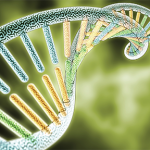In a collaborative effort between the pharmaceutical industry, academia, and community rheumatologists, researchers are evaluating a new biomarker screening test that might help identify patients with rheumatoid arthritis (RA) who are unlikely to benefit from anti-tumor necrosis factor-α (TNFα) medications.
Titled the “Biomarkers of Anti-TNF Treatment Efficacy in Rheumatoid Arthritis–Unresponsive Populations (BATTER-UP),” the study is enrolling 1,000 patients with moderate to severe disease who have had an unsatisfactory response to conventional disease-modifying antirheumatic drugs and are about to start treatment with an anti-TNF agent, or who have had an inadequate response to an initial anti-TNF drug and are about to switch to a different one.
“There is a crying need to understand whether there are genetic or other biomarker predictors of TNF response in RA,” says co-lead investigator Peter Gregersen, MD, director of the Center for Genomics and Human Genetics at the North Shore-Long Island Jewish Hospital’s Feinstein Institute for Medical Research in Manhasset, N.Y. “Only 30% of RA patients have a really robust response to TNFs. Close to 30% have no response at all. We don’t have any idea what distinguishes those two groups of people.”
Get Involved
Interested in being a part of BATTER-UP? Contact Crescendo Bioscience at [email protected] or 855-874-3544 for more information.
The BATTER-UP study will test an eight-gene biomarker set that Dr. Gregersen and colleagues have previously identified as predictive of anti-TNF responsiveness in RA patients.1 The genes are CLTB, MXRA7, CXorf52, COL4A3BP, YIPF6, FAM44A, SFRS2, and PGK1.
“With 1,000 patients, we should find out if Dr. Gregersen’s preliminary data are correct,” says co-lead investigator Michael E. Weinblatt, MD, John R. and Eileen K. Riedman professor of medicine at Brigham and Women’s Hospital in Boston. He added that if “we see something in this study, we want a larger study to validate it before a test can be available for clinical use.” He estimated that the BATTER-UP study, from enrollments to evaluations, will probably last about two years. Further, the study consortium is structured as an academia–industry collaboration with a scientific Advisory board and publication team to ensure rapid dissemination of research.
“It would be great to have a laboratory test that would assist us in making recommendations to patients about treatment approaches in this era of multiple targeted therapies,” Dr. Weinblatt says. “We don’t know yet which treatment will work best for each patient. This is one of the first steps to address this issue.”
